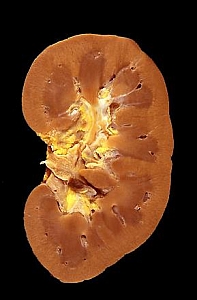11 March 2014. An intermediate-stage clinical trial by La Jolla Pharmaceutical Company in San Diego shows patients with chronic kidney disease taking the company’s drug candidate succeeded in improving their kidney functions, compared to similar patients taking a placebo. However, the drug code-named GCS-100 appears effective only in lower rather than higher doses. The findings are scheduled for presentation at a Roth investment conference this week in Dana Point, California.
Chronic kidney disease is a condition caused mainly by diabetes and high blood pressure, where kidneys lose their ability to function normally, with complications such as anemia, bone weakness, and nerve damage. The condition also increases the risk of heart or blood vessel disease, and can lead to kidney failure. National Kidney Foundation says some 26 million American adults have chronic kidney disease.
GCS-100 is a complex carbohydrate compound derived from pectin, a naturally-occurring fiber found in citrus fruit pulp and skin. The compound, administered as an intravenous injection, binds and sequesters galectin-3, a protein which in excess amounts is associated with various degenerative processes in the body, including cancer, tissue fibrosis, and organ failure.
The clinical trial tested GCS-100 in two doses — 1.5 milligrams or 30 milligrams per square meter — against a placebo, among 121 patients with chronic kidney disease in the U.S. at four locations. Patients received the drug or placebo once a week for eight weeks.
The trial look primarily for changes in estimated glomerular filtration rate, a test of kidney function; glomeruli are tiny filters in kidneys that remove waste from the blood. The study also measured any effects of the drug on the amount of galectin-3 circulating in the body, as well as the drug’s safety and tolerability.
La Jolla says patients taking GCS-100 at the lower concentration, 1.5 milligrams per square meter, reported higher estimated glomerular filtration rates compared to the placebo, between the start and end of treatments. Patients receiving the lower dose also had lower levels of circulating galectin-3. Differences between patients taking GCS-100 at the higher dose or the placebo were not large enough to be statistically reliable, either for glomerular filtration rates or levels of galectin-3.
The company says GCS-100 was well tolerated. Of the 121 patients, 117 completed the trial. Two serious adverse events were reported, but not specified, among patients taking GCS-100 at the higher dose, which La Jolla says were not related to the drug. No adverse effects were reported among patients taking the drug at the lower dose.
Read more:
- Clinical Trial to Test Engineered Enzyme with Kidney Failure
- Portable Kidney Test Device with Smartphone App Developed
- FibroGen, AstraZeneca Partner on Kidney-Based Anemia Therapy
- Kidney Disease Technology Start-Up Lands $9.5M Venture Funds
- AstraZeneca Licenses Kidney Disease Complications Treatment
* * *


 RSS - Posts
RSS - Posts
You must be logged in to post a comment.